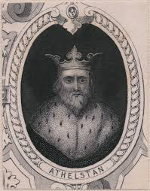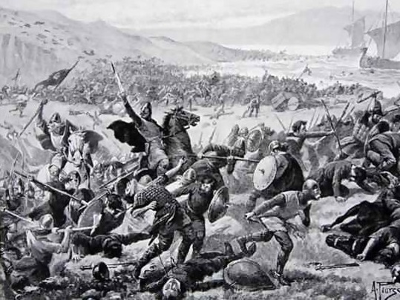Æthelstan: First King of All England
Æthelstan is most well-known for being the first official "king of all England." A grandson of Alfred the Great, he had, in his time, a reputation arguably as luminous. 
Æthelstan was born in 894. His father was Edward the Elder, and his grandfather, Alfred the Great, was still on the throne of Wessex, doing battle against the invading Danes. Edward the Elder had two wives. The first wife, Ecgwynn, died not long after giving birth to Æthelstan. Edward married again, and his second wife, ÆelfflÆd, gave birth to Ælfweard. Alfred died in 899, and Edward the Elder became king. He succeeded in conquering large amounts of land at the expense of other Anglo-Saxon kingdoms. He died in 924, and a brief succession controversy ensued. Ælfweard claimed the right to succeed his father, and he was supported in this claim by Wessex. Mercia, which at this time was also in the Wessex fold but still technically a separate territory, supported Athelstan's claim as king. Things didn't come to a head militarily because Æfweard died, of natural causes, three weeks after his father died and so Æthelstan became King of Wessex and all of its domains. He had another brother, named Edwin; just to make, Æthelstan banished Edwin, sending him off with no provisions and no way to return home. Æthelstan later regretted this rash action and tried to make up for it by giving to the poor and committing acts of piety. He was crowned king in 925 and set about unifying the rest of the Anglo-Saxons under his banner. He annexed Northumbria in 926 and committed his sister Edith in marriage to Sihtric, the king of York, which was then the Viking kingdom of Yorvik. When Sihtric died the following year, Æthelstan claimed York for himself and kept it when Sihtric's cousin invaded and tried to retake it. Also in 926, Æthelstan forced submissions from Strathclyde, Wales, the Picts, and the Scots. Leaders of the various other kingdoms gathered on July 12, 927 and accepted Æthelstan as their overlord. Thus, he was the first to call himself "King of the English." Sources from the time period or shortly thereafter also refer to him as such. 
The bold Æthelstan led an invasion of Scotland in 934 and forced the Scottish king, Constantine II, to recognize him as overlord. Three years later, when Constantine made an alliance with King Olaf of Dublin and Owain, king of the northern Britons with an eye toward defeating the English, Æthelstan cemented his power by defeating a combined Celt-Danish-Scot-Viking army at the Battle of Brunanburh. This battle is said to have one of the bloodiest in the history of the Anglo-Saxon wars. Historians to this day still do not know where it took place. This victory gained him international recognition, and he eventually developed alliances on the Continent, furthering those alliances by sending military aid to Brittany, the Franks, and even Norway and ensuring that his sisters married into European royalty, including Hugh the Great of France and Otto the Great of Germany. One of the young nobles that #&198;thelstan had watched over at court took the Western Frankish throne as Louis IV in 936. In more domestic matters, he is known for pursuing the kinds of legal reforms that his grandfather had. He also had a lot of time for religion, founding a number of churches and keeping his own collection of holy relics. And, he minted his own coins, a privilege not usually enjoyed by monarchs at this time. Æthelstan died on October 27, 939, at Gloucester. His half-brother, Edmund, succeeded him. |
|




